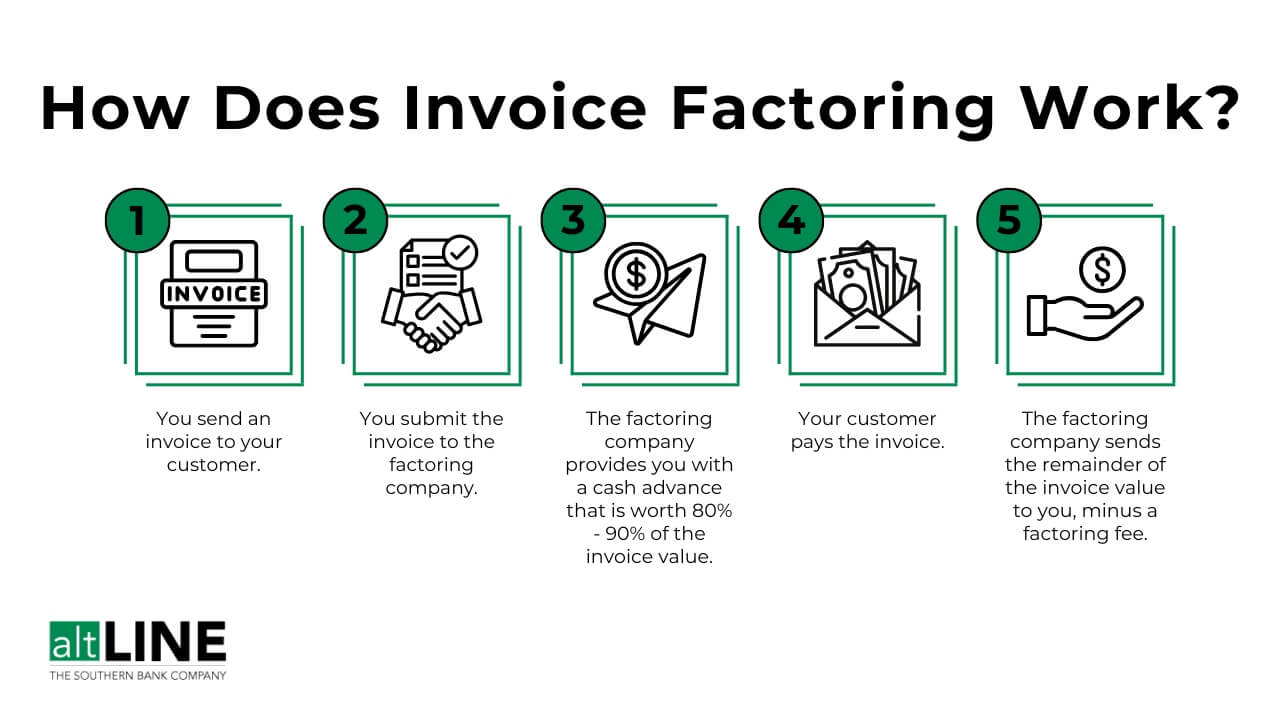There are risks associated with invoice factoring, including hidden fees, loss of control, reduced profit margins, and customer perception. Invoice factoring may also result in finance companies contacting your customers.

Credit: altline.sobanco.com
Understanding Invoice Factoring Risks
Types Of Risks
There are various types of risks associated with invoice factoring that businesses need to be aware of:
- Hidden fees: Some factoring companies may have hidden fees, which can significantly impact the cost of factoring. It is important to carefully review the terms and conditions to avoid any unexpected charges.
- Loss of control: When invoices are factored, the factoring company takes control of the collection process. This can lead to a loss of control over customer relations and payment collections.
- Reduced profit margins: Factoring companies charge a fee for their services, which can reduce the profit margins of businesses. It is crucial to consider the cost of factoring and its impact on overall profitability.
- Customer perception: Some customers may view invoice factoring as a sign of financial instability. This negative perception can impact business relationships and the overall reputation of the business.
Impact On Business
Invoice factoring can have both positive and negative impacts on a business:
- Improved cash flow: One of the main benefits of invoice factoring is the improved cash flow it provides. Factoring allows businesses to access immediate funds, which can be used for business operations, growth, or resolving financial challenges.
- Minimum factoring requirements: Factoring companies may impose certain requirements for businesses to qualify for their services. These requirements can include minimum monthly invoice volume, creditworthiness of customers, and industry-specific factors.
- Finance companies contacting customers: When invoices are factored, the factoring company may contact customers directly for payment. While this can relieve the burden of collections for the business, it can also affect customer relationships.
It is important for businesses to carefully assess the risks and benefits of invoice factoring before deciding to utilize this financial option. Understanding the potential risks can help businesses make informed decisions and mitigate any negative impacts on their operations.
Safeguarding Your Business
One of the crucial steps in safeguarding your business when considering invoice factoring is performing due diligence. This involves thoroughly researching potential factoring companies to ensure they have a solid reputation and a track record of reliable service. Look for companies that specialize in your industry, as they will have a better understanding of your unique needs and challenges. Evaluate their experience, customer testimonials, and online reviews to gain insights into their reliability and professionalism.
When partnering with a factoring company, it’s essential to assess the creditworthiness of your customers. This helps minimize the risk of non-payment and default. Conduct a thorough analysis of your clients’ financial health, including their payment history, credit ratings, and industry standing. Additionally, consider implementing credit checks and credit limits to ensure invoices are factored only for customers who have a proven track record of timely payments. By assessing customer creditworthiness, you can mitigate the risk of financial loss.
To further safeguard your business, consider diversifying your customer base. Relying heavily on a few customers for factoring can increase the risk of financial instability if any of them fail to pay their invoices. By expanding your client portfolio, you reduce the concentration risk and increase your chances of maintaining a steady cash flow. Explore opportunities to target new markets and industries, and build connections with potential customers. Diversification not only helps protect your business from individual customer risks but also provides opportunities for growth and stability.
Mitigating Financial Risks
Invoice factoring can be a valuable financing option for businesses looking to improve cash flow and manage their working capital. However, like any financial arrangement, it comes with its own set of risks. To ensure a smooth and successful factoring experience, it’s essential to implement strategies for mitigating these risks.
Managing Hidden Fees
One of the potential risks of invoice factoring is the presence of hidden fees. Financial institutions may charge fees that are not clearly disclosed upfront, leading to unexpected expenses for businesses. To manage this risk, it is crucial to carefully review and understand the terms and conditions of the factoring agreement before signing. Additionally, businesses should request a breakdown of all potential fees involved in the factoring process, such as processing fees, monthly service fees, and early termination fees. By being aware of these fees in advance, businesses can budget accordingly and avoid any unwelcome surprises.
Calculating Invoice Factoring Costs
Calculating the true cost of invoice factoring is another important step in mitigating financial risks. While factoring can provide immediate cash flow, it typically comes at a higher cost compared to traditional financing options like bank loans. To accurately assess the cost, businesses should consider the factoring rate, which is the percentage of the invoice amount that the factoring company retains as their fee. It is also essential to factor in any additional charges, such as credit protection fees or reserve requirements. By accurately calculating and comparing the costs associated with different factoring companies, businesses can make an informed decision that aligns with their financial goals.
Minimizing Loss Of Control
Another potential risk of invoice factoring is the loss of control over the collection process and customer relationships. When businesses factor their invoices, the factoring company takes over the responsibility of collecting payment from the customers. This transfer of control can sometimes lead to strained relationships or miscommunication with customers. To mitigate this risk, businesses should choose a reputable factoring company that prioritizes maintaining positive customer relationships. It is also advisable to clearly communicate the factoring arrangement to customers to minimize any confusion or concerns. By proactively managing customer relationships and ensuring open lines of communication, businesses can minimize the risk of losing control over their sales process.
Dealing With Reduced Profit Margins
While the immediate injection of cash through invoice factoring can be beneficial for businesses, it can also lead to reduced profit margins. The factoring fees and associated costs can eat into the overall profitability of the business, impacting the bottom line. To deal with this risk, businesses should carefully evaluate their profit margins and consider whether the benefits of improved cash flow outweigh the potential reduction in profitability. It may be necessary to adjust pricing strategies or seek alternative financing options to maintain healthy profit margins. By closely monitoring profitability and exploring strategic solutions, businesses can effectively navigate the potential impact on their bottom line.
By addressing the risks associated with invoice factoring proactively, businesses can reap the numerous benefits it offers while minimizing any negative impact on their financial health. From managing hidden fees to calculating costs, minimizing loss of control, and dealing with reduced profit margins, these strategies can help businesses make the most of invoice factoring and optimize their financial management.

Credit: businessfactors.com
Maintaining Customer Perception
When it comes to invoice factoring, it’s essential to maintain a positive customer perception. Utilizing invoice factoring can potentially impact how your customers perceive your business and its financial stability. Keeping a consistent and positive image in the eyes of your customers is crucial for continued success.
Maintaining Customer Relationships
Building and maintaining strong customer relationships is vital when implementing invoice factoring. Clear communication and transparency can help reassure customers that their interests are being considered, fostering trust and loyalty.
Improving Communication
Effective communication with customers is essential to ensure they understand the invoicing process and any changes resulting from factoring. Prompt and clear communication can alleviate any potential concerns or misconceptions, fostering a positive customer perception.
Balancing Credit Terms
Ensuring a balance in credit terms is crucial to maintain customer satisfaction while leveraging invoice factoring. Careful consideration of credit terms can help prevent any negative impact on your customer relationships and overall perception.
Effects On Cash Flow
Invoice factoring offers numerous benefits for businesses, but it’s also important to be aware of the potential risks it brings, particularly its effects on cash flow. Understanding these risks can help businesses make informed decisions and take proactive measures to mitigate any disruptions to their cash flow.
Understanding Cash Flow Challenges
One of the primary risks associated with invoice factoring is the potential impact on cash flow. By factoring their invoices, businesses may receive immediate funds, but they could also face the challenge of reduced cash reserves in the long term. This can lead to difficulties in meeting day-to-day expenses and managing operational costs, which are crucial for sustaining business operations.
Leveraging Invoice Finance
When leveraging invoice finance, businesses should carefully assess their current and future cash flow needs. While invoice factoring can provide quick access to funds, it’s essential to consider the overall impact on cash flow dynamics. By strategically utilizing invoice finance, businesses can enhance their working capital and address specific financial requirements without compromising their long-term cash flow stability.
Minimizing Cash Flow Disruptions
To minimize the disruptions to cash flow resulting from invoice factoring, businesses can implement proactive measures. These may include optimizing invoice management processes, negotiating favorable terms with factoring companies, and maintaining strong customer relationships to mitigate any potential delays in invoice settlements. By taking proactive steps, businesses can mitigate the impact of invoice factoring on their cash flow and ensure sustained financial stability.

Credit: www.facebook.com
Frequently Asked Questions For Invoice Factoring Risks
How Risky Is Invoice Discounting?
Investing in invoice discounting carries risks. It’s important to consider factors like the creditworthiness of the customer, as default on payment is a higher risk with non-creditworthy customers. Other risks include hidden fees, the cost of invoice factoring, loss of control, reduced profit margins, and potential negative customer perception.
There is also a possibility of finance companies contacting your customers.
Is Invoice Factoring Worth It?
Invoice factoring can be worth it for businesses, especially those with bad credit. Factoring companies focus on your customers’ creditworthiness, not yours. However, there are risks such as hidden fees, loss of control, reduced profit margins, and negative customer perception.
It’s crucial to carefully consider these factors before deciding if invoice factoring is worth it for your business.
What Are The Risks Faced By A Factor In Factoring Contract?
Factoring contracts come with certain risks such as hidden fees, reduced control, loss of profit margins, and negative customer perception. Finance companies may also contact your customers and there may be minimum requirements for factoring. It is important to carefully consider these risks before entering into a factoring contract.
What Are The Disadvantages Of Using A Factoring Company?
Factoring companies may charge hidden fees and cost more than a line of credit. Factoring only solves one problem and can be labor-intensive. Finance companies may also contact your customers, and they do not handle bad debt.
Conclusion
It is important for investors to carefully consider the risks associated with invoice factoring. Factors such as the creditworthiness of the customer and the potential loss of control and reduced profit margins should be taken into account. Additionally, the negative perception and stigma attached to invoice factoring can also impact customer perception.
While invoice factoring can improve cash flow, it is essential to weigh the risks and benefits before making a decision.